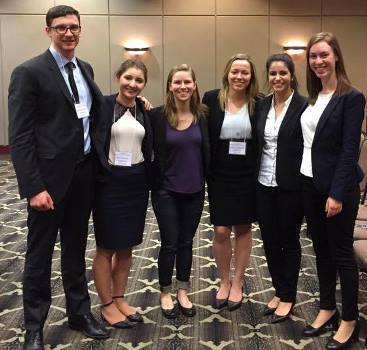
Queen’s Law team members are national champions after winning the Canadian round of the Philip C. Jessup International Law Moot. That means they’ll head to Washington, D.C., on April 8 to compete in the highly competitive global round of the world’s largest moot.
The Canadian finals were held March 3–5 in in Edmonton. Queen’s sent oralists Jodie Al-Mqbali, Law’18, Caileigh Gruner, Law’17, Kate Mitchell, Law’17, and Blake Van Santen, Law’18, researcher Anna-Lee Beamish, Law’18, and student coach Diana Holloway, Law’17.
Faculty coach Darryl Robinson says ultimately it was his team’s preparation and execution that set them apart from the rest. “The whole Queen’s team put in law-firm hours for two terms. They developed fantastic knowledge of the law and the issues, worked wonderfully as a team and they mastered the sweet mystical science of ‘Judge Whispering.’ This was a very well deserved outcome in every way.”
The fall term was spent mostly working on the written portion of the competition with student coach Stephanie Bishop, Law’17, and the winter term on the oral arguments with Holloway.
Van Santen, one of the appellants, says both aspects have to be top notch if you’re going to succeed. “I had to completely re-learn how to do legal writing,” Van Santen says. “If a single word is not pulling its weight, it has to go.
“The best part about it was the great teamwork,” he adds. “You have to finesse your edits to your teammates’ factums and it requires everyone setting aside ego. We came out better friends and teammates because of it.”
But he said the biggest challenge was converting the arguments that worked well in the factum (called memorials at the moot) into good oral arguments.
“You’re trying to make your arguments more pithy, more suited to the judges. What’s good on paper isn’t always good in person. It can sound convoluted.”
Teammate Al-Mqbali was impressed by the high level of competition. “It was amazing to be surrounded by people who had all been immersing themselves in the facts of the same case and developing their legal arguments for months and a real pleasure to hear so many excellent speakers.”
The team, she says, is indebted to their coaches and researcher for all the time and energy they put into preparing the oralists.
“As a respondent, I found it particularly challenging because oralists are not confined to arguments made in their written submissions,” she says. “Thankfully, Anna-Lee also sat at counsel's table and took notes furiously, preparing counter-arguments for us automatically as she went along. Quite honestly, I don't think the respondent team could have survived without her!”
Despite being in the middle of exams, the team says they’re excited to compete in Washington.
“I don't think anything can really replace the amazing learning opportunities offered by practical experience,” Al-Mqbali says.
“Besides, we get to study for finals in the Library of Congress!”
By Jeremy Mutton